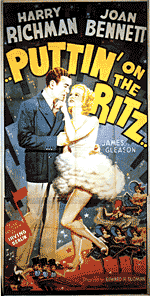
The Hollywood Revue of 1929, or simply The Hollywood Revue, is a 1929 American pre-Code musical comedy film released by Metro-Goldwyn-Mayer. It was the studio's second feature-length musical, and one of their earliest sound films. Produced by Harry Rapf and Irving Thalberg and directed by Charles Reisner, it features nearly all of MGM's stars in a two-hour revue that includes three segments in Technicolor. The masters of ceremonies are Conrad Nagel and Jack Benny.

The Broadway Melody, also known as The Broadway Melody of 1929, is a 1929 American pre-Code musical film and the first sound film to win an Academy Award for Best Picture. It was one of the early musicals to feature a Technicolor sequence, which sparked the trend of color being used in a flurry of musicals that would hit the screens in 1929–1930. Today, the Technicolor sequence survives only in black and white. The film was the first musical released by Metro-Goldwyn-Mayer and was Hollywood's first all-talking musical.

Footlight Parade is a 1933 American pre-Code musical film directed by Lloyd Bacon, with songs written by Harry Warren (music), Al Dubin (lyrics), Sammy Fain (music) and Irving Kahal (lyrics). The film's numbers were staged and choreographed by Busby Berkeley. It starred James Cagney, Joan Blondell, Ruby Keeler and Dick Powell, with featured appearances by Frank McHugh, Guy Kibbee, Hugh Herbert, and Ruth Donnelly.

Joan Geraldine Bennett was an American stage, film, and television actress. She was one of three acting sisters from a show-business family. Beginning her career on the stage, Bennett appeared in more than 70 films from the era of silent films, well into the sound era. She is best remembered for her film noir femme fatale roles in director Fritz Lang's films—including Man Hunt (1941), The Woman in the Window (1944), and Scarlet Street (1945)—and for her television role as matriarch Elizabeth Collins Stoddard in the gothic 1960s soap opera Dark Shadows, for which she received an Emmy nomination in 1968.
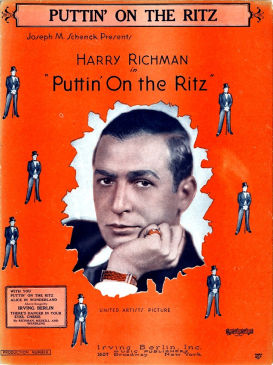
"Puttin' On the Ritz" is a song written by Irving Berlin. He wrote it in May 1927 and first published it on December 2, 1929. It was registered as an unpublished song on August 24, 1927 and again on July 27, 1928. It was introduced by Harry Richman and chorus in the musical film Puttin' On the Ritz (1930). According to The Complete Lyrics of Irving Berlin, this was the first song in film to be sung by an interracial ensemble. The title derives from the slang expression "to put on the Ritz", meaning to dress very fashionably. This expression was inspired by the opulent Ritz Hotel in London.

Harry Richman was an American singer, actor, dancer, comedian, pianist, songwriter, bandleader, and nightclub performer, at his most popular in the 1920s and 1930s. In his peak years, he was one of the highest‐paid performers in show business.

Blue Skies is a 1946 American musical comedy film directed by Stuart Heisler and starring Bing Crosby, Fred Astaire, and Joan Caulfield. Based on a story by Irving Berlin, the film is about a dancer who loves a showgirl who loves a compulsive nightclub-opener who can't stay committed to anything in life for very long. Produced by Sol C. Siegel, Blue Skies was filmed in Technicolor and released by Paramount Pictures. The music, lyrics, and story were written by Irving Berlin, with most of the songs recycled from earlier works.
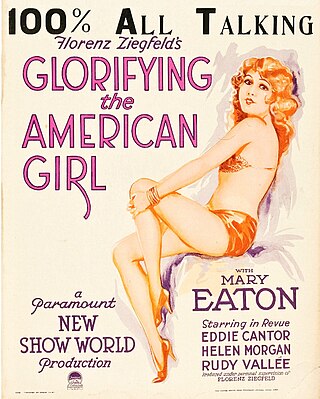
Glorifying the American Girl is a 1929 American pre-Code musical comedy film produced by Florenz Ziegfeld that highlights Ziegfeld Follies performers. The last third of the film, which was filmed in early Technicolor, is basically a Follies production, with appearances by Rudy Vallee, Helen Morgan, and Eddie Cantor.

No, No, Nanette is a 1930 American pre-Code musical comedy film with Technicolor sequences that was directed by Clarence G. Badger and released by First National Pictures. It was adapted from the play of the same title by Otto A. Harbach and Frank Mandel. No, No, Nanette was a popular show on Broadway, running for 321 performances, and was produced and directed by Harry Frazee.

Mammy (1930) is an American pre-Code musical drama film with Technicolor sequences, released by Warner Bros. The film starred Al Jolson and was a follow-up to his previous film, Say It with Songs (1929). Mammy became Al Jolson's fourth feature, following earlier screen efforts as The Jazz Singer (1927), The Singing Fool (1928) and Say It with Songs (1929). The film relives Jolson's early years as a minstrel man. The songs were written by Irving Berlin, who is also credited with the original story titled Mr. Bones.
"I Used to Be Color Blind" is a popular song written by Irving Berlin for the 1938 film Carefree, where it was introduced by Fred Astaire. The Astaire recording was very popular in 1938.

Children of Pleasure is a 1930 American pre-Code MGM musical comedy film directed by Harry Beaumont, originally released with Technicolor sequences. It was adapted from Crane Wilbur's 1929 play, The Song Writer.
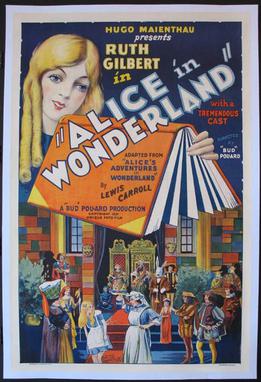
Alice in Wonderland (1931) is an independently made black-and-white Pre-Code American film based on Lewis Carroll's 1865 novel Alice's Adventures in Wonderland, directed by Bud Pollard, produced by Hugo Maienthau, and filmed at Metropolitan Studios in Fort Lee, New Jersey.

Maybe It's Love is an all-talking 1930 pre-Code American musical comedy film produced and distributed by Warner Bros. and directed by William A. Wellman. The movie stars Joan Bennett, Joe E. Brown and James Hall. The film is based on George Ade's 1904 play The College Widow and is a remake of Warner's own 1927 silent version of the story, which starred Dolores Costello. The play had also been filmed in 1915, starring Ethel Clayton.
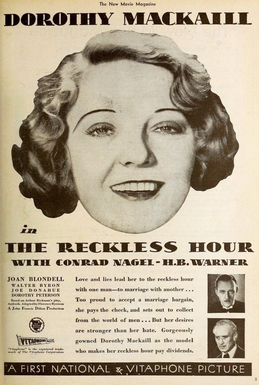
The Reckless Hour is a 1931 American pre-Code drama film directed by John Francis Dillon and starring Dorothy Mackaill, Conrad Nagel, H.B. Warner and Joan Blondell. It was produced and distributed by First National Pictures, which was controlled by Warner Brothers. It was based on the play Ambush by Arthur Richman.

"Limehouse Blues" is a popular British song written by the London-based duo of Douglas Furber (lyrics) and Philip Braham (music).
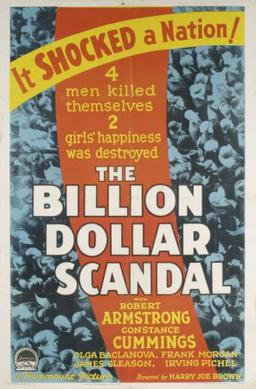
The Billion Dollar Scandal is a 1933 American pre-Code drama film directed by Harry Joe Brown and written by Beatrice Banyard, Willard Mack and Gene Towne. The film stars Robert Armstrong, Constance Cummings, Olga Baclanova, Frank Morgan, James Gleason, Irving Pichel and Warren Hymer. The film was released on January 7, 1933 by Paramount Pictures.

Blue Skies is a studio album of phonograph records by Bing Crosby and Fred Astaire released in 1946 featuring songs that were presented in the American musical film Blue Skies. Like Song Hits from Holiday Inn, the entire 78 rpm album would be composed of Irving Berlin songs written specifically for the film. This was the first release of one of Astaire's greatest songs, "Puttin' On the Ritz", on shellac disc record.
"With You" is a 1929 song by Irving Berlin. The lyrics commence: " With you, a sunny day; / Without you, clouds in the sky". The song was sung by Harry Richman and Joan Bennett in the 1930 film Puttin' On the Ritz.
"Puttin' On the Ritz" is a song written by Irving Berlin.
